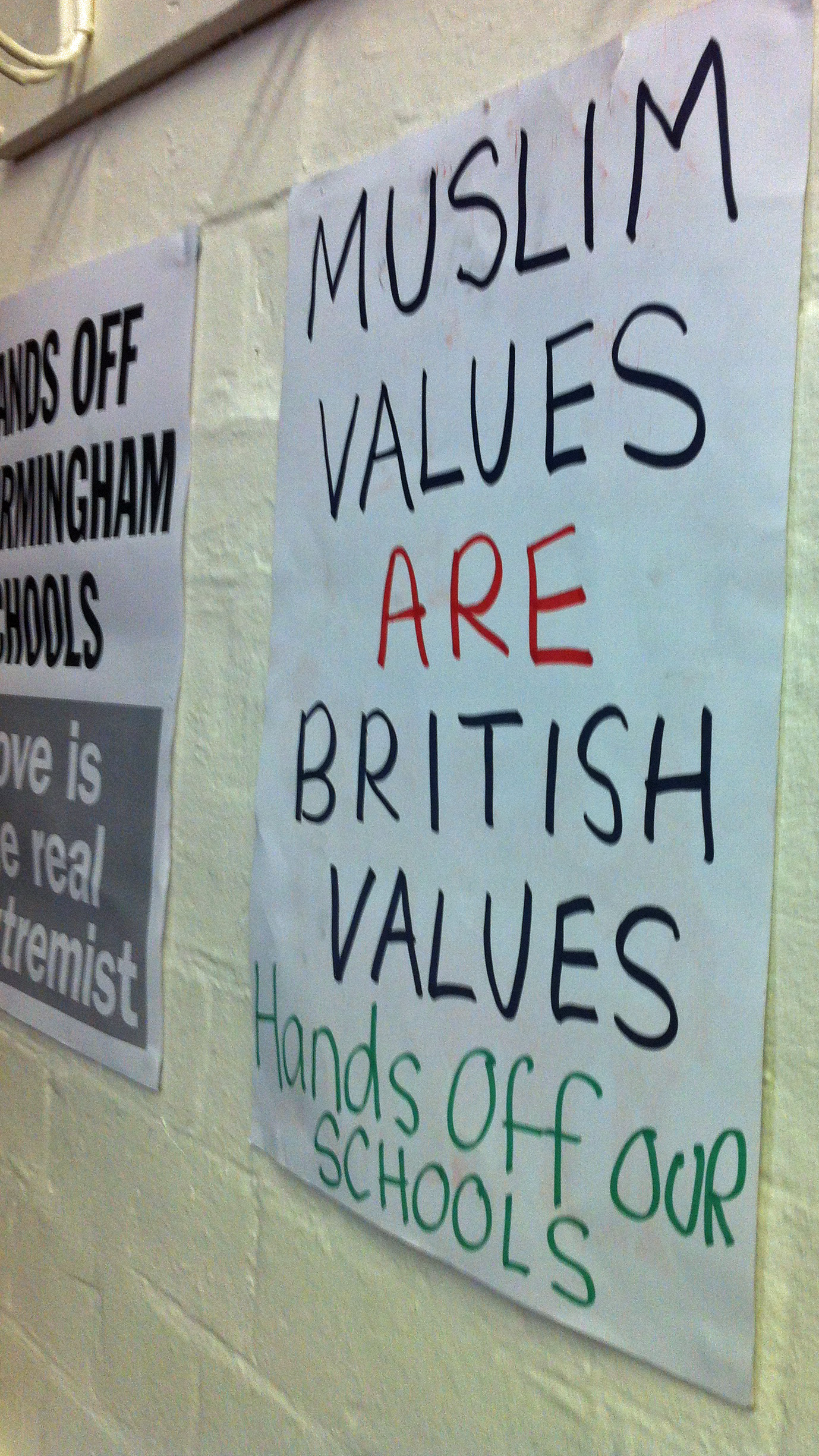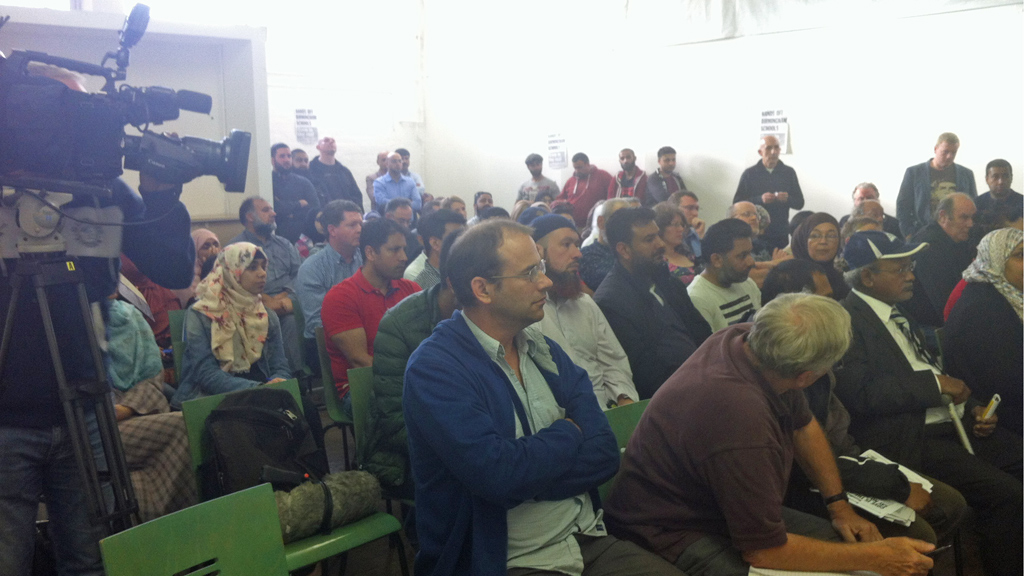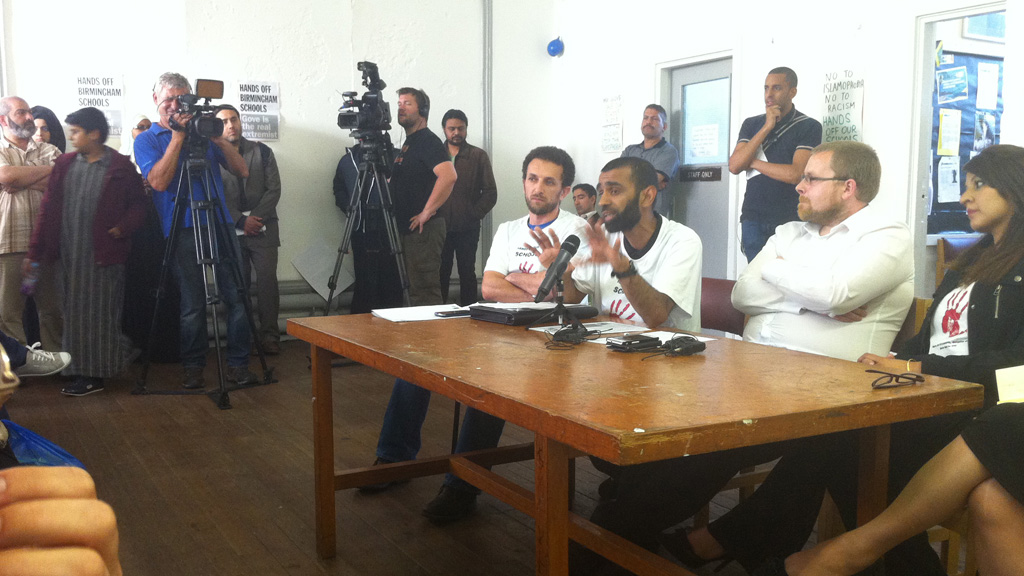‘Trojan horse’ public meeting: what did we learn?
 Darshna Soni
Communities Editor
Darshna Soni
Communities Editor
“Muslim values are British values” declared the posters around the hall as parents, teachers and governors gathered at a hall in Small Heath, Birmingham, to discuss their response to Ofsted’s report.

“We are all British and we are proud of that. We have always felt like we are part of Britain, that we are well integrated – until now,” said Naeem Yousef.
Like many of those in the room, Mr Yousef has children who attend one of the schools that had been rated outstanding last year, but which has now been placed in special measures.
A number of teachers said that, historically, there had been a pattern of underachievement in the schools, many of which are in deprived areas of Birmingham. “But all of us, including the governors, worked really hard to turn them around. Now we are being criticised,” said one.
“Islamic values are not the problem,” said one head of year. “It’s secular values.” He claimed that secular values in society led to “social ills, including drinking, the sexualisation of children and anti-social behaviour. Our parents don’t want this for their children, they want a good Islamic upbringing.”
And yet none of the schools are faith schools – they are meant to be secular, open to all, and there was a heated discussion when some parents raised this issue.
“I have been in this country for more than 30 years,” Mr Ahmed told the meeting. “I am shocked about what I have heard is going on in our schools, and it makes me sad about what people must now be thinking about my community. If we live in Britain, we must live by British laws and customs.”
One father asked representatives from Oldknow Academy: “Is it true that you cancelled Christmas? If so, why?

Shabina Bano, from the Oldknow Parents’ Association, said that her two daughters had always celebrated Christmas at the school. “I don’t know where this accusation has come from,” she said. “I’ve got pictures on my Facebook page from last year that show them at a Christmas party – I posted the pictures months ago, so I couldn’t have just made this up.”
Ms Bano was referring to suggestions by Michael Gove this week that Ofsted inspectors had been deceived by the schools they had visiting, that the schools had “covered up” what was really going on inside.
Many in the room felt Ofsted had had an “agenda” when they visited the schools, and that they had already made up their minds. One teacher who had been interviewed by inspectors claimed: “The first thing they asked me was what I would do if a pupil came forward to say he was gay. That was before they had even introduced themselves, or asked what I do.”

“They focused on segregation,” said another teacher. “I told them it’s not extremist to have separate swimming lessons for girls and boys.”
Many parents felt that the government was confusing conservative religious beliefs with extremism.
The majority of the people in the room were Muslim, but there was also a handful of Christians from the local church, including Father Oliver Cross. He said all communities in the area had always worked harmoniously together. The vicar pointed out that other schools were based on a Christian ethos.
There was much debate about religious freedoms. “Michael Gove wanted schools to become academies, to have freedoms to do what they want. But when Muslims do that, we are accused of extremism.”
Listening to the debate last night, one thing was clear. Whatever you think of the Trojan horse allegations, and the role of religion in British schools, the way it has been handled has left many British Muslims feeling that Islam is under attack, that their values and way of life are under siege.
These feelings will have to be addressed if we really are to promote the inclusive, cohesive society that has been much talked about this week.
-
Latest news
-
Laughing Boy: New play tells the tragic tale of Connor Sparrowhawk5m

-
Sewage warning system allows some of worst test results to be left off rating system, analysis shows3m

-
Post Office inquiry: Former CEO didn’t like word “bugs” to refer to faulty IT system4m

-
Israeli soldier speaks out on war in Gaza12m

-
PM’s defence spending boost should be ‘celebrated’, says former Armed Forces Minister4m

-




